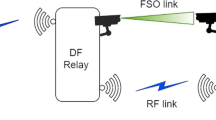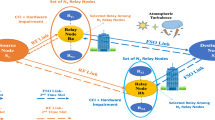Abstract
An analytical study of the performance of a mixed radio frequency (RF)/free space optical communication (FSO) cooperative relaying system is presented in this research. A non-orthogonal multiple access (NOMA) strategy is studied in this paper. It has been anticipated that the relay node of the mixed RF/FSO system will operate in accordance with the decode-and-forward (DF) protocol, it has also been assumed that there is a direct link between the source and destination nodes. The RF links have been modeled using the Nakagami-\(m\) distribution, and assumed that the Malaga distribution has been used to mimic the atmospheric turbulence on the FSO link. When analyzing the FSO link model, it is important to consider the influence of pointing error as well as the type of optical demodulation system used, which includes intensity modulation direct detection and coherent demodulation. The analytical equations for the outage probability and ergodic capacity of the proposed NOMA network have been derived. To describe the derived results in terms of elementary functions, the outage analysis for the mixed RF/FSO DF system has been extended to include the particular situation of high signal-to-noise ratio conditions. RF and FSO system parameters were investigated in terms of their impact on the overall dependability and throughput offered by the system using the analytical methodology developed. Monte-Carlo simulation has been used to verify the numerical results that have been obtained.






Similar content being viewed by others
Data Availibility
Data sharing not applicable to this article as no datasets were generated or analysed during the current study.
Abbreviations
- \(h_{{12}}\) :
-
Fading coefficient of the \(S-R\) link
- \(a_1, a_2\) :
-
Power coefficients
- \(P_1\) :
-
RF power for transmitting symbol \(s_1\)
- \(h_{{13}}\) :
-
Fading coefficient on the RF \(S-D\) link
- \(P_2\) :
-
RF power for transmitting symbol \(s_2\)
- \(s_1, s_2\) :
-
Symbols
- \(g_{{23}}\) :
-
FSO link’s irradiance
- \(P_F\) :
-
Optical power transmitted
- \(r\) :
-
Type of optical demodulation scheme
- \(n_{13}\) :
-
AWGN factor on \(S-R\) link
- \(n_{23}\) :
-
AWGN factor on \(R-D\) link
- \(n_{13}\) :
-
AWGN factor on \(S-D\) link
- \(m_{1j}\) :
-
Nakagami-\(m\) fading parameter
- \(\beta _{1j}\) :
-
\(\frac{m1j}{\bar{\gamma }_{1j}}\)
References
Dahrouj, H., Douik, A., Rayal, F., Al-Naffouri, T. Y., & Alouini, M.-S. (2015). Cost-effective hybrid RF/FSO backhaul solution for next generation wireless systems. IEEE Wireless Communications, 22(5), 98–104.
Lee, E., Park, J., Han, D., & Yoon, G. (2011). Performance analysis of the asymmetric dual-hop relay transmission with mixed RF/FSO links. IEEE Photonics Technology Letters, 23(21), 1642–1644.
Choi, J. (2014). Non-orthogonal multiple access in downlink coordinated two-point systems. IEEE Communications Letters, 18(2), 313–316.
Ding, Z., Peng, M., & Poor, H. V. (2015). Cooperative non-orthogonal multiple access in 5G systems. IEEE Communications Letters, 19(8), 1462–1465.
Tabassum, H., Hossain, E., & Hossain, J. (2017). Modeling and analysis of uplink non-orthogonal multiple access in large-scale cellular networks using poisson cluster processes. IEEE Transactions on Communications, 65(8), 3555–3570.
Zhang, Z., Ma, Z., Xiao, M., Ding, Z., & Fan, P. (2017). Full-duplex device-to-device-aided cooperative nonorthogonal multiple access. IEEE Transactions on Vehicular Technology, 66(5), 4467–4471.
Yue, X., Liu, Y., Kang, S., Nallanathan, A., & Ding, Z. (2018). Exploiting full/half-duplex user relaying in NOMA systems. IEEE Transactions on Communications, 66(2), 560–575.
Do, T. N., da Costa, D. B., Duong, T. Q., & An, B. (2018). Improving the performance of cell-edge users in NOMA systems using cooperative relaying. IEEE Transactions on Communications, 66(5), 1883–1901.
Najafi, M., Jamali,V., Diamantoulakis, P. D., Karagiannidis, G. K., & Schober, R. (2018). Non-orthogonal multiple access for FSO backhauling. In 2018 IEEE Wireless Communications and Networking Conference (WCNC) (pp. 1–6).
Jamali, M. V., Azimi-Abarghouyi, S. M. & Mahdavifar, H. (2018). Outage probability analysis of uplink NOMA over ultra-high-speed FSO-backhauled systems. In 2018 IEEE Globecom Workshops (GC Wkshps) (pp. 1–6).
Saxena, P., & Bhatnagar, M. R. (2020). 1-bit feedback-based beamforming scheme for an uplink FSO-NOMA system with SIC errors. Applied Optics, 59(36), 11274–11291.
Jamali, M. V., & Mahdavifar, H. (2020). Uplink non-orthogonal multiple access over mixed RF-FSO systems. IEEE Transactions on Wireless Communications, 19(5), 3558–3574.
Upadhya, A., Dwivedi, V. K., & Singh, G. (2018). Relay-aided free-space optical communications using \(\alpha -\mu\) distribution over atmospheric turbulence channels with misalignment errors. Optics Communications, 416, 117–124.
Upadhya, A., Dwivedi, V. K., & Singh, G. (2019). Multiuser diversity for mixed RF/FSO cooperative relaying in the presence of interference. Optics Communications, 442, 77–83. https://doi.org/10.1016/j.optcom.2019.02.040.
Upadhya, A., Dwivedi, V. K., & Alouini, M.-S. (2019). Interference-limited mixed MUD-RF/FSO two-way cooperative networks over double generalized gamma turbulence channels. IEEE Communications Letters, 23(9), 1551–1555.
Upadhya, A., Dwivedi, V. K., & Karagiannidis, G. K. (2020). On the effect of interference and misalignment error in mixed RF/FSO systems over generalized fading channels. IEEE Transactions on Communications, 68(6), 3681–3695.
Ansari, I. S., Yilmaz, F., & Alouini, M.-S. (2016). Performance analysis of free-space optical links over \({\cal{M}}\)\(\acute{a}\)laga (\(\cal{M}\)) turbulence channels with pointing errors. IEEE Transactions on Wireless Communications, 15(1), 91–102.
Tonk, V. K., Upadhya, A., Yadav, P. K., & Dwivedi, V. K. (2020). Mixed MUD-RF/FSO two way dcode and forward relaying networks in the presence of co-channel interference. Optics Communications, 464, 125415. https://doi.org/10.1016/j.optcom.2020.125415.
AlQuwaiee, H., Ansari, I. S., & Alouini, M.-S. (2015). On the performance of free-space optical communication systems over double generalized Gamma channel. IEEE Journal on Selected Areas in Communications, 33(9), 1829–1840.
Bambiwal, S. B., Upadhya, A., Yaduvanshi, R. S., & Pandey, V. K. (2020). Partial relay selection for combating the effects of co-channel interference in RF/FSO cooperative relaying. Optics Communications, 475, 126186. https://doi.org/10.1016/j.optcom.2020.126186.
Upadhya, A., Gupta, J., Dwivedi, V. K., & Alouini, M. S. (2020). Impact of RF I/Q imbalance on interference-limited mixed RF/FSO TWR systems with non-zero boresight error. IEEE Wireless Communications Letters, 10, 1.
Goel, A., Upadhya, A., & Dwivedi, V. K. (2021). Diversity aided millimeter-wave/free space optical cooperative relaying systems. International Journal of Communication Systems. https://doi.org/10.1002/dac.4700.
Hong, Y. -W. P., Huang, W. -J., & Kuo, C. -C. J. (2010). Cooperative communications and networking: Technologies and system design. Springer.
Navas, A. J., Balsells, J. M. G., & ParisJF, Notario AP. (2011). A unifying statistical model for atmospheric optical scintillation. Numerical Simulations of Physical and Engineering Processes, 181(8), 181–205.
Farid, A. A., & Hranilovic, S. (2007). Outage capacity optimization for free-space optical links with pointing errors. Journal of Lightwave Technology, 25(7), 1702–1710.
Olver, F. W. J., Lozier, D. W., Boisvert, R. F., & Clark, C. W. (2010). Nist handbook of mathematical functions (1st ed.). Cambridge Univ. Press.
Wolfram, I. (2010). Wolfram, research, mathematica edition: Version 10.0. champaign. Wolfram Research, Inc.
Mittal, P., & Gupta, K. (1972). An integral involving generalized function of two variables. Proceedings of the Indian Academy of Sciences, 75(3), 117–123.
Gradshteyn, I. S. & Ryzhik, I. M. (2007). Table of integrals, series and products. In A. Jeffrey (Ed.), (7th ed.,) Elsevier Inc.
Author information
Authors and Affiliations
Corresponding author
Additional information
Publisher's Note
Springer Nature remains neutral with regard to jurisdictional claims in published maps and institutional affiliations.
Rights and permissions
About this article
Cite this article
Upadhya, A. Investigation of Mixed RF/FSO Decode-and-Forward NOMA Cooperative Relaying Networks. Wireless Pers Commun 124, 2923–2938 (2022). https://doi.org/10.1007/s11277-022-09496-2
Accepted:
Published:
Issue Date:
DOI: https://doi.org/10.1007/s11277-022-09496-2




